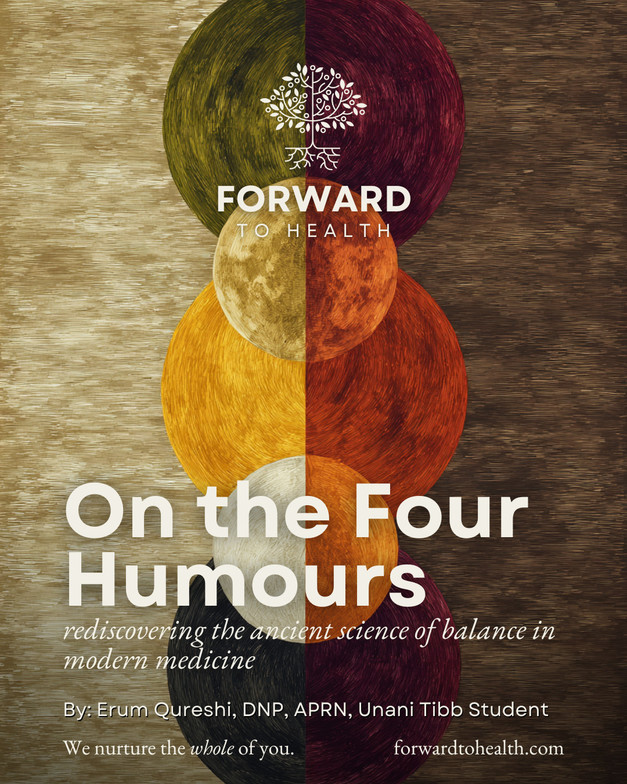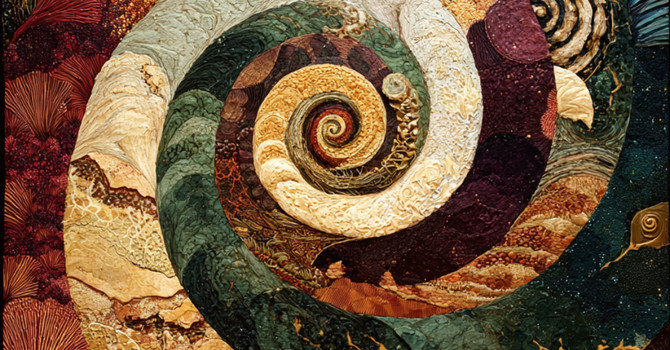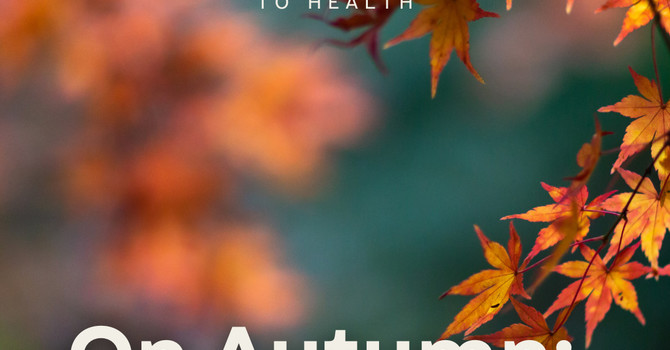
On the Four Humours: Rediscovering the Ancient Science of Balance in Modern Medicine
By Dr. Erum Qureshi, DNP, APRN, Unani Tibb Student
As I was walking with a friend one afternoon in the park, I tripped over a piece of wood on the path and fell - not hard, but just enough to make it funny. Without thinking, I burst into laughter. My friend helped me up, laughing too, and said, “You really have a good sense of humor and very clumsy feet!”
We both smiled at the lightheartedness of the moment. But as we continued walking, I found myself wondering - where does that phrase, “sense of humor,” even come from, is it possible that it’s connected to the Four Humours?
As it turns out, it is. The phrase reaches back thousands of years - to a medical and philosophical system that once explained not only health and illness, but also personality, mood, and emotional well-being: the Four Humours.
Let’s dig into the Ancient Science of the Four Humours
The concept of the Four Humours is one of the oldest frameworks for understanding human health and temperament. Originating in Greek medicine through Hippocrates (460–370 BCE) and refined by Galen (129–216 CE), it proposed that the human body is governed by four vital fluids - blood, phlegm, yellow bile, and black bile.
Each humour carries its own elemental nature, organ association, and temperament. These humours are the byproducts of the food we digest and serve as the core nourishment for the body, organs, and all vital functions.
Understanding this once-fundamental concept - now almost forgotten in modern medicine - is essential, for it was the foundation of healing for centuries across civilizations.
When the humours are in balance, we experience vitality, clarity, and emotional harmony. When they are disturbed, imbalance manifests as illness - not only in the body, but also in the mind and spirit.
Why the Four Humours Matter for Modern Medicine
A Personal Wake-Up Call
About a year ago, my father was hospitalized for an uncontrolled fever. His temperature would spike to 103°F for several days, subside briefly, and then rise again. This cycle continued for nearly three weeks. As he is in his eighties, every episode felt like a life-threatening event.
When we finally took him to the emergency room, what followed was an exhausting month-long hospital stay that seemed to create more harm than healing. What may have initially been malaria - a common infection circulating at the time - was never officially diagnosed. Instead, he was given multiple antibiotics and labeled with various conditions: tuberculosis, cardiac inflammation, fluid overload, and even retinal detachment. They eventually discharged him stating that it was a viral infection - which ultimately required only supportive care that he would have best received at home.
Through continuous prayer and spiritual reliance, Alhamdulillah, my father eventually recovered. But this experience left me with a heavy realization - our modern medical system, while advanced, often lacks intuition, the healer’s innate sense of discernment that cannot be replaced by machines or lab results.
Healers of the past didn’t only diagnose through tests - they observed, listened, smelled, touched, and felt their patients. They treated the whole being, not just the disease. It was this realization that reignited my passion for the study of Unani Tibb and the science of the Four Humours, which I believe holds a timeless key to restoring humanity in healing.
In today’s healthcare system, where technology often overshadows intuition, the Four Humours offer a forgotten but powerful perspective.
For medical practitioners, understanding humoural theory encourages a return to personalized, human-centered care. It invites clinicians to observe, listen, and understand patients as whole beings - not just a set of lab results or diagnoses.
Practitioners who study the science of the humours learn to:
- Recognize individual differences in disease expression and response to treatment.
- Identify emotional and environmental triggers behind chronic illnesses.
- Recommend temperament-based diets and routines to prevent imbalance.
- Integrate psychological and spiritual awareness into physical care.
- Restore empathy and clinical intuition - the heart of healing.
“A physician who understands the temperament of a patient heals with gentleness and wisdom.” — Paraphrasing of Ibn Sina, Canon of Medicine
For nurses, doctors, and holistic practitioners alike, this ancient science can revitalize modern practice by bringing soul and context back into medicine.
The Unani and Prophetic Connection
When Greek medicine reached the Islamic world, it was refined and harmonized by scholars such as Ibn Sina (Avicenna), Al-Razi, and Al-Majusi, giving rise to Unani Tibb - a deeply holistic medical system rooted in balance, moderation, and harmony with nature.
In Prophetic Medicine (Tibb an-Nabawi), the same principles are echoed. The Prophet Muhammad ﷺ emphasized moderation in eating, sleeping, emotions, and worship—all of which align with humoural balance.
- Fasting purifies excess humours and gives the body rest.
- Cupping (Hijama) removes excess blood and heat.
- Black seed, honey, dates, and olive oil nourish and balance.
- Dhikr and salah calm the spirit, reducing inner “heat” and tension.
Both systems teach that disease results from imbalance—and healing comes by restoring harmony within the body, mind, and soul.
The Science of Balance: The Four Humours and the Six Lifestyle Factors
Along with much of the historical knowledge that deserves to be revisited in modern healing, Unani medicine offers one particularly profound concept: that the humours remain in balance through six essential lifestyle factors. These are known as the Asbab-e-Sitta Zarooriya — the Six Necessary Causes — which govern every aspect of our physical, emotional, and spiritual well-being.
The Six Lifestyle Factors That Govern Health
In Unani Tibb and Prophetic Medicine, these six essentials are the foundation for maintaining humoural balance and preventing disease. When even one of them becomes disturbed, imbalance arises in the body, leading to illness of both the physical and emotional realms.
- Air & Environment – Breathe clean air, spend time outdoors, and live-in alignment with the natural seasons.
- Food & Drink – Choose foods that suit your temperament; balance temperature, quality, and timing of meals.
- Sleep & Wakefulness – Prioritize deep rest and maintain consistent sleep cycles, ideally in rhythm with the night and day.
- Movement & Rest – Incorporate regular movement and allow sufficient recovery. Overexertion and stagnation both breed imbalance.
- Emotions – Emotions are energies that alter humours; cultivating calm and gratitude maintains inner equilibrium.
- Evacuation & Retention – Healthy elimination and detoxification are essential for removing excess humours and maintaining clarity.
By attending to these six areas, we heal not just symptoms but the root cause of imbalance. Modern medicine often focuses on the “what,” but Unani and Prophetic frameworks remind us to look at the “why” — why the imbalance occurred in the first place.
Practical Tips to Begin Balancing Your Humours
- Identify Your Temperament (Mizaj): Notice your natural tendencies - are you warm, cool, dry, or moist by nature?
- Eat Seasonally: Nature provides what you need in each season. Adjust meals accordingly - lighter foods in summer, warming soups in winter.
- Use Herbs with Purpose: Warming: Ginger, cinnamon, black seed. | Cooling: Mint, rose, cucumber.
- Live by Natural Rhythms: Align eating, sleeping, and spiritual practices with sunrise and sunset.
- Incorporate Dhikr & Gratitude: A peaceful heart soothes the nervous system and harmonizes all four humours.
- Purify Regularly: Fasting, hijama (cupping), and herbal detox teas help eliminate excess humours.
- Seek Moderation: Extremes of heat, cold, stress, or rest all disrupt harmony.
“The best of affairs are those done in moderation.” - Prophet Muhammad ﷺ
Final Reflection
The Four Humours remind us that health is not a fixed condition - it is a dynamic state of balance between body, mind, and spirit. When we understand our unique temperament and live in harmony with nature’s laws, we return to our fitrah - our innate divine design.
By reconnecting to these timeless principles, both individuals and healthcare practitioners can transcend symptom management and rediscover what true healing feels like.
Join the Journey: Understanding the Four Humours in Depth
If this ancient science has captivated your curiosity, I invite you to join my upcoming five-week in-depth course on the Four Humours.
In this course, we will explore:
- The history and philosophy behind the Four Humours.
- What each humour represents, how it functions, and its vital role in maintaining health.
- The concept of temperament (Mizaj) and how it shapes your physical, emotional, and spiritual state.
- Practical methods to balance your temperament through the light of the Six Lifestyle Factors.
- And throughout it all, we’ll uncover how the Prophetic lifestyle and teachings beautifully align with these ancient wisdom traditions - guiding us toward a more holistic, compassionate way of caring for ourselves, our patients, and our loved ones.
This journey is not just about learning an ancient theory - it’s about rediscovering the art of balance, intuition, and harmony within the modern world of healing.



